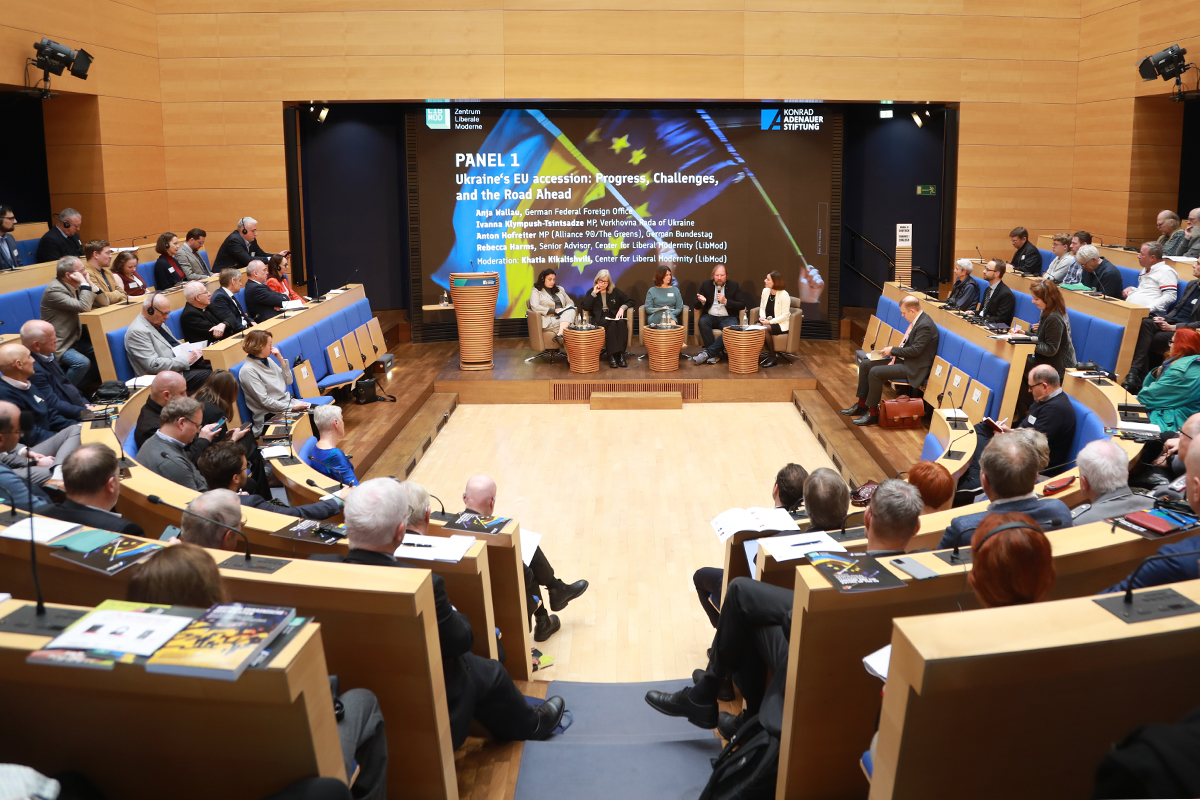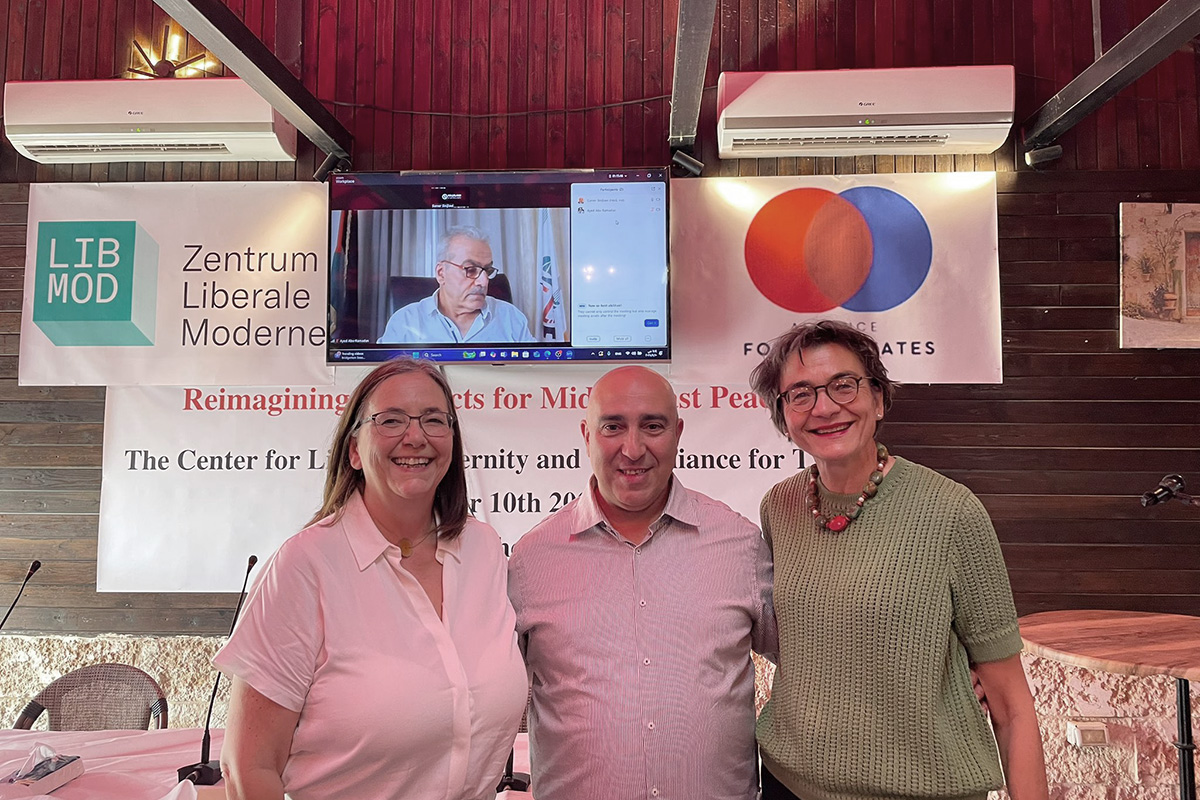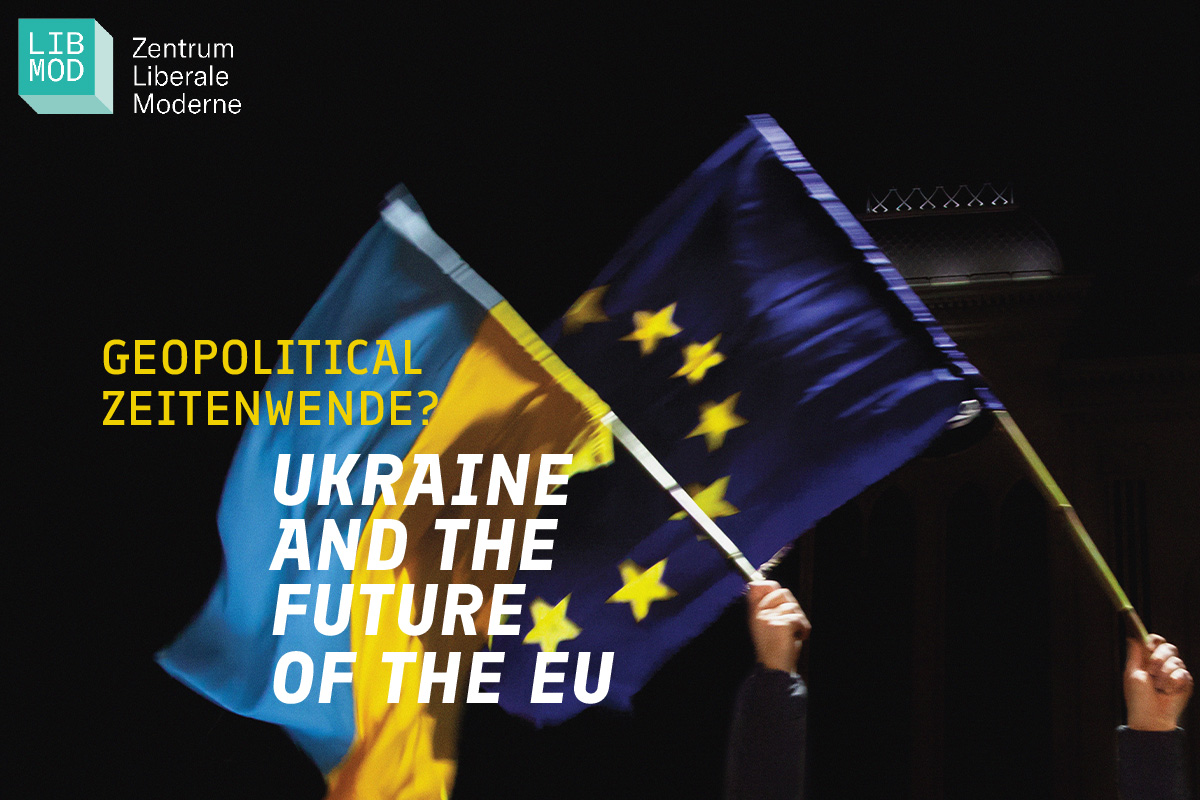We must act now, otherwise it will be the end of our democratic order

“What peace? Ukraine and Us” — two questions that could not be more fundamental were the focus of our international conference, the third since the Russian full-scale invasion of Ukraine in February 2022: What does the war in Ukraine mean for the West, and what goals must a future peace order fulfill?
The West is becoming increasingly tired of supporting Ukraine. Voices of self-proclaimed ‘pacifists’ on German streets and in state parliaments are shouting “peace” ever more loudly — but really meaning the de facto subjugation of Ukraine. In the meantime, people in Ukraine are heading for a harsh winter. Putin is using cold as a weapon and is relying on attrition and fear.
Peace is only possible through military strength
Volodymyr Zelensky has just presented his long-held secret “victory plan” in Washington and at the EU summit and has been widely criticized for it. Key points include: Ukraine must be integrated into European and transatlantic alliances, and it can only negotiate with Russia from a position of military strength. This necessarily means that it is allowed to attack airfields within Russia — in accordance with international law, by the way — in order to effectively protect its airspace.
“What we are trying to avoid is the so-called World War II Russian narrative of nuclear deterrence. It has seeped into our psyche and nourishes the Russian narrative. We have been asleep the last two years. What is driving this strategic fog is fear. The conclusions we draw from history are the wrong ones. Sometimes you have to escalate in order to deescalate. Ukraine can win. We can turn everything around in Ukraine the next year.“ Alina Polyakova
An effective protection would also be the desired NATO membership of Ukraine. This is not only in the interest of Ukraine, but it is not only in the interest of the Balkan states and the Baltic countries. It is also in the interest of the whole of Europe and the liberal West. It is in Germany’s own best interest.
Ukraine’s security is our security
For Putin, Ukraine is just the beginning, he says that very clear and audible. But we are ignoring reality and still refuse to act decisively. Decisiveness is now the only way to prevent a much larger war and to protect our democratic and liberal values, the global world order and our own population. It is the only way to secure our own future. The good news is: If we are determined now and not too hesitant, this can be achieved. Then, but only then, can Ukraine win. It is up to us. If we don’t, the war will continue. And it will become far more costly and dangerous than it already is.
Ukraine doesn’t just need us. We also need Ukraine.
„There are forces within the German population that want to make us believe that Ukraine is none of our business. Ukraine is also defending our European security and the international rules-based order. The outcome of this war will answer the question of whether it will be possible to shift borders by force in the 21st century. Putin’s war aim is not limited to Ukraine; Putin is concerned with the failure of NATO and the failure of the international order. He wants to replace these systems with his own sphere of influence and assert his influence by force and military strength. Peace on such a basis is not sustainable as long as Moscow is not prepared to accept territorial integrity and sovereignty. Tobias Lindner
Even if we don’t want to: We have long been at war with Russia
It’s already not just a war in Ukraine: Disinformation campaigns, murders, acts of sabotage, cyberattacks and espionage... All of this is part of the hybrid war that Russia has been waging against the West for years: Against NATO and above all against Germany. Also because we — unlike the Balkan states, unlike Poland — have fallen for Putin’s narrative and are falling for his rhetoric that feeds fear and insecurity.
“The leadership in the US is either unable or unwilling to understand the changes. Our security, our transatlantic security and our peace is being threatened by two powers: China and Russia. If we don’t stop them in Ukraine, we have to face them somewhere else. The administration in the US and Germany have enforced their weakness. They have managed to do this by playing up the Russian nuclear threat.” John E. Herbst
While German politicians never tire of emphasizing what they will not do in order not to enrage Putin and prevent the spectre of nuclear war that he has cleverly conjured up from becoming reality (“No attacks on Russian territory”, “We are not at war with Russia”), Russia repeats very clearly who it is at war with: It is not Ukraine alone, it is the West, it is us.
Alliance with Western democrats
The outcome of the elections in the USA is imminent and it is hard to predict what this will mean for Europe, NATO and the alliances of Western democracies. Ukraine’s accession processes to the European Union are in full swing, but they are complicated and lengthy. A swift admission of Ukraine to the EU would also be of central importance. One might think that the adversities and cruel realities of war would have weakened Ukraine in its efforts to join the EU. The opposite is the case: the democratization processes continues to receive great support from civil society.
Global alliances of autocrats
Meanwhile, Russia has long since formed alliances with other autocrats and is pursuing a clear strategy, something we lack. Russia is attacking Ukraine with Iranian drones, it is supported by China, and South Korea’s secret service reports that it has evidence about North Korea soldiers being trained in Russia for the war in Ukraine. Not to mention the close alliances with Belarus, which shares a border with Latvia, Lithuania and Poland, where Putin uses migrants as weapons.
„Where is there an outcry about North Korea intervening in the war? Where is there an outcry about the alliance with Iran? We have a Moscow connection in Germany. We also have to come to terms with that. We must demand that Russia recognizes the right of its neighboring states to exist. We must demand the withdrawal of nuclear weapons in Kaliningrad. We must demand that Georgia be stabilized again. Peace can only exist in freedom and security.“ Roderich Kiesewetter
What is at stake here is not trivial: it is about our security, our freedom, our democratic values. As cynical as it sounds, supporting Ukraine decisively now is the cheapest way to protect ourselves.
“The cheapest way to help Ukraine is to give all weapons at once. You will pay less if you pay it all at once. The worst scenario is to make a deal on the basis of giving up. Then as a consequence, in eight years from now, we will have another war. We have a whole generation of people to lose. It is important to think strategically but not on the basis of fear. Because that is what Putin expects.” Inna Sovsun
This means not sending weapons according to the principle of “too little, too late”; it would be more expedient to give Ukraine all the weapons at once and allow it not only to intercept the missiles, but also to enable it to hit the missile launcher itself. In other words: to attack airfields inside Russia.
Strengthening the resilience of the energy infrastructure
So far, Ukraine has only been able to protect itself against Russia’s attacks to a limited extent and so the daily attacks in Ukraine are not only costing more and more lives, Russia is also deliberately destroying Ukraine’s energy infrastructure. Ukraine is facing a winter that threatens to be the worst since the beginning of the Russian full-scale invasion. Moscow is using cold as a weapon. Strengthening the resilience of Ukraine’s infrastructure on the one hand and rebuilding destroyed parts on the other is therefore crucial. Protection is cheaper than reconstruction. However, protection can only be achieved through military strength.
Abusive concept of peace
This military strength is the only conceivable basis for a peace worthy of the name. Where Russian troops are already occupying Ukrainian territory, what threatens the rest of the country if Russia continues to advance, already prevails: Murder, torture, kidnapping. This is not peace. Peace must not only be sustainable, it must also necessarily include freedom and security.
But it is precisely this peace that Russia rejects. All efforts by the West to negotiate with Moscow have so far come to nothing. Regardless of this, the demands for peace from the growing illiberal forces of BSW and AfD and the increasingly loud voices on German streets are not directed at Putin, but at Ukraine. They are repeating Putin’s propaganda and calling for a de facto capitulation of Ukraine, which would also be disastrous for our own security. Because Putin will continue.
„We must maintain our strength as a democratic country. Russia is investing heavily in destroying and destabilizing democracies. We see the poison of extremist simplification: AfD and BSW are spreading this poison with their messages. We could do a lot, but only if we remain stable democracies. We must not succumb to the temptation to feed political escalation. We are faced with a choice between liberal democracy and autocracy. It’s not trivial, everything is at stake.“ Robin Wagener
It is the job of politicians to tell people the truth
Explaining this to the German population, dealing with responsible voters in an adult manner and speaking unpleasant truths would be the task of politics. Because people can be expected to handle the truth. Only those who know it can draw the right conclusions and make their own decisions.
„Surveys show: If politics is honest and speaks an honest language, then it is also possible to find majorities in politics for the right actions. We need these debates. We live in times in which the question arises as to whether our children and grandchildren will still be able to live in peace, security and democracy. That is what matters today.“ Agnieszka Brugger
Instead, Putin’s fear narratives are being repeated, making the Kremlin’s rhetoric a far more effective weapon than any Iranian drone, however modern it may be.
“Chancellor Scholz should have countered the fears of the population and not encouraged the aggressor by backing down. He should have clearly stated what we are defending here.” Johann David Wadephul
So far, we have been playing Putin’s game. We are playing along and anxiously assuming the role assigned to us. We urgently need to take a fundamentally different view of the war in Ukraine and of Russia. Moscow is waging an imperialist, colonialist war in the middle of the 21st century.
“Imperialism is in many ways seen as Western imperialism. So it is about colonizing the distant ones, that’s the narrative. The racist projection is: You cannot overcome the difference, because the difference is racial. Instead, the Russian colonialization is about the colonialization of the enclosed ones. The narrative is: ‘You are not different to me, but you are the same as me. So it is about assimilation.” Volodymyr Yermolenko
Instead of understanding this, romanticized images of Russia still prevail in Germany. We need a change of perspectives, a fundamental one. We have to recognize: The Ukraine war is our war. It is a global war that can only be won through military strength and together as an alliance of democrats. To do this, we need Ukraine just as much as it needs us. We must act. Right now. Either Europe wakes up from its deep sleep or it will be the end of European values and the order we grew up with.
“The situation is dark, but the only chance we have is by fighting united and by having no fear.” Lesia Ogryzko
“There is no other way for the West to survive than to become more active and decisive. Stop listening to Putin and start listening to the voice of reason.” Inna Sovsun
![]()
Hat Ihnen unser Beitrag gefallen? Dann spenden Sie doch einfach und bequem über unser Spendentool. Sie unterstützen damit die publizistische Arbeit von LibMod.
Spenden mit Bankeinzug
Spenden mit PayPal
Wir sind als gemeinnützig anerkannt, entsprechend sind Spenden steuerlich absetzbar. Für eine Spendenbescheinigung (nötig bei einem Betrag über 200 EUR), senden Sie Ihre Adressdaten bitte an finanzen@libmod.de
Verwandte Themen
Newsletter bestellen
Mit dem LibMod-Newsletter erhalten Sie regelmäßig Neuigkeiten zu unseren Themen in Ihr Postfach.




















































